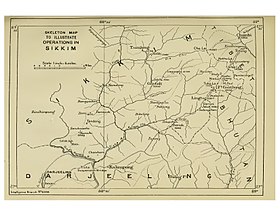Sikkim Expedition
| Sikkim expedition | |||||||
|---|---|---|---|---|---|---|---|
 The theatre of war in Sikkim |
|||||||
|
|||||||
| Belligerents | |||||||
|
|
|||||||
| Commanders and leaders | |||||||
|
|
|||||||
The Sikkim expedition was an 1888 British military expedition to expel Tibetan forces from Sikkim in present-day north east India. The roots of the conflict lay in British-Tibetan competition for sovereignty over Sikkim.
Sikkim had a long history of relations with Tibet. Buddhism was the state religion and its Chogyal rulers were descended from Shabdrung Ngawang Namgyal, a Tibetan saint who unified Bhutan. In the first half of the 19th century, the British extended their influence to the Himalayas and Sikkim signed the Treaty of Tumlong with the British in 1861. As the British established relations with Nepal, Sikkim and Bhutan, Tibetan influence waned and in Lhasa and Peking it was feared that if left unopposed, the British would encroach into Tibet through Sikkim.
Thutob Namgyal, the 9th Chogyal of Sikkim, looked to the Dalai Lama for spiritual leadership and during his reign the Tibetan government started to regain political influence over Sikkim. Under the 1861 treaty, the Chogyal was restricted to spending no more than three months in Tibet but he frequently ignored this provision and in 1887, after having resided for almost two years in Tibet he declined to travel to Darjeeling to meet with the Lieutenant-Governor arguing that the Amban in Lhasa had forbidden him to do so. Meanwhile, he had ordered that the revenue collected be sent to Chumbi, a clear sign of his intention not to return to Sikkim.
...
Wikipedia
